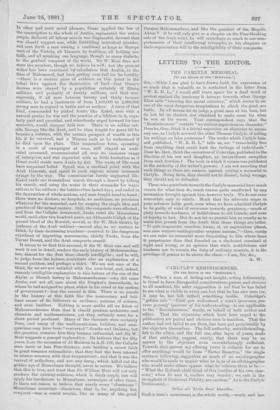LETTERS TO THE EDITOR.
THE CARLYLE MEMORIAL.
[TO THE EDITOR Or THE " SPICOTATOR.".1 Sin,—While I am glad to have drawn forth the expression of so much that is valuable as is contained in the letter from "W. E. H. L.," I would still crave space for a final word of protest against the tendency it betrays towards what George Eliot calls "lowering the moral currency," which seems to me one of the most dangerous temptations to which the good are liable. By all means let us judge a groat man at his best, but do not let us slacken our standard to make room for what he was at his worst. Your correspondent says that the " Reminiscences " contain "no serious aspersions on character." Does he, then, think it a trivial aspersion on character to accuse any one, as Carlyle accused the other Thomas Carlyle, of selling his writings on false pretences P The works which Carlyle him- self published, " W. E. H. L." tells us, arc "remarkably free from anything that could hurt the feelings of individuals." Does be, then, think the caricature of Coleridge, published in the life-time of his son and daughter, an insignificant exception from such freedom p The book in which it occurs was published in the maturity of the writer's powers. 1 am not asserting that such things as these are reasons against raising a memorial to Carlyle. Being facts, they should not be denied ; being wrongs, they should not be defended.
Those who gontribute towards the Carlyle memorial have much reason for what they do, much reason quite unaffected by any accusation brought against him, however truly. We do not raise memorials only to saints. Much that his advocate urges in your columns holds good, even when we have admitted Carlyle to be guilty of want of reverence towards greatness,—much of piety towards lowliness, of faithfulness to old friends, and even of loyalty to fact. But do not let us punish him so cruelly as to make him preach from the tomb that these things are trifles. " Si quis magnorum manibus locus ; si, ut sapientibus placet, non cum corpore exstinguuntur magnao animae,"—then, surely we can raise no memorial more disquieting to him whose fame it perpetuates than that founded on a slackened standard of right and wrong, or an opinion that while truthfulness and kindness are to remain the duty of ordinary mortals, it is the privilege of genius to be above the claim.—I am, Sir, &e., A. W.



















 Previous page
Previous page